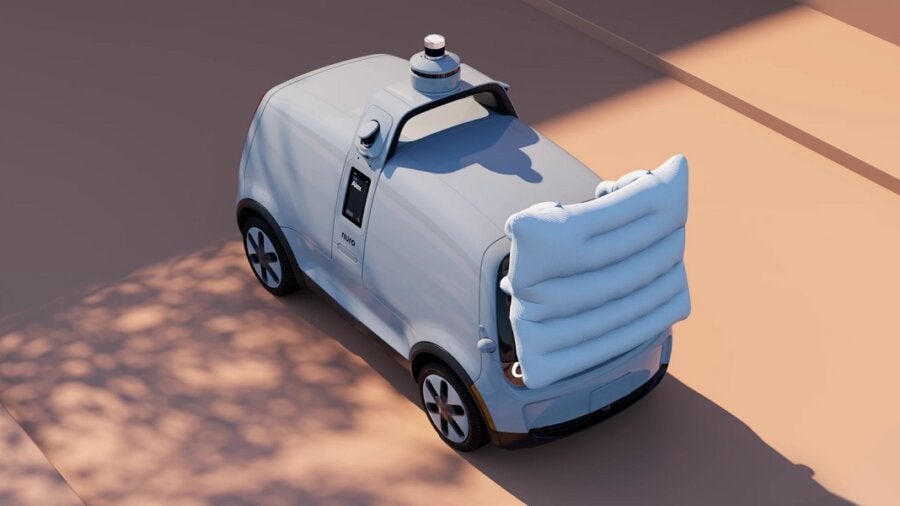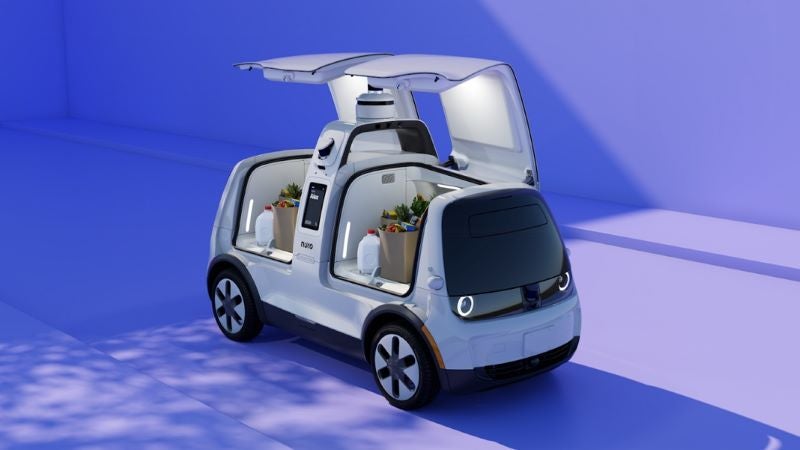
Autonomous delivery was already on multiple companies’ research and development agenda before the pandemic, but when people stopped wanting to leave their homes it took on a whole new level of urgency (and potential for profit). Besides the fact that the pandemic doesn’t seem to be subsiding—note the continuous parade of new Greek-letter variants—our habits have been altered in a lasting way, with more people shopping online and getting groceries and other items delivered to their homes.
This week Nuro, a robotics company based in Mountain View, California unveiled what it hopes will be a big player in last-mile delivery. The company’s third-generation autonomous delivery vehicle has some impressive features, and some clever ones—like external airbags that deploy if the vehicle hits a pedestrian (which hopefully won’t happen too often, if ever).
Despite being about 20 percent smaller in width than the average sedan, the delivery bot has 27 cubic feet of space inside; for comparison’s sake, the tiny SmartForTwo has 12.4 cubic feet of cargo space, while the Tesla Model S has 26. It can carry up to 500 pounds and move at a speed of 45 miles per hour.

Nuro has committed to minimizing its environmental footprint—the delivery bot runs on batteries, and according to the press release, the company will use 100 percent renewable electricity from wind farms in Texas to power the fleet (though it’s unclear how they’ll do this, as Texas is pretty far from northern California, and that’s where the vehicles will initially be operating).
Nuro’s first delivery bot was unveiled in 2018, followed by a second iteration in 2019. The company recently partnered with 7-Eleven to do autonomous deliveries in its hometown (Mountain View) using this second iteration, called the R2—though in the initial phase of the service, deliveries will be made by autonomous Priuses.
The newest version of the bot is equipped with sensors that can tell the difference between a pile of leaves and an animal, as well as how many pedestrians are standing at a crosswalk in dense fog. Nuro says the vehicle “was designed to feel like a friendly member of the community.” This sounds a tad dystopian—it is, after all, an autonomous robot on wheels—but the intention is in the right place. Customers will retrieve their orders and interact with the bot using a large exterior touchscreen.
Whether an optimal future is one where any product we desire can be delivered to our door within hours or minutes is a debate all its own, but it seems that’s the direction we’re heading in. Nuro will have plenty of competition in the last-mile delivery market, potentially including an Amazon system that releases multiple small wheeled robots from a large truck (Amazon patented the concept last year, but there’s been no further word about whether they’re planning to trial it). Nuro is building a manufacturing facility and test track in Nevada, and is currently in the pre-production phase.
Image Credit: Nuro
* This article was originally published at Singularity Hub

0 Comments